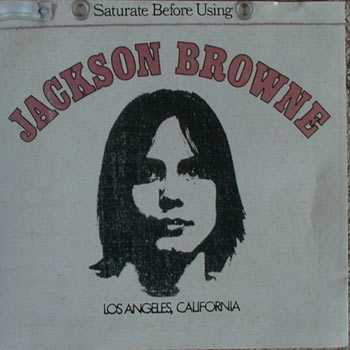Reading a Jackson Browne interview in Nature Conservancy where he says, “I’ve heard a number of people put forth the idea that my activism or my talking about political things in my music has resulted in less success, less sales at one time or another. … But even if it were true, it wouldn’t be a hard choice to make. It’s more important to struggle for what you know is right and for what you feel to be valuable,” reminded me once again why I’ve always loved his music so much.
“Doctor My Eyes” one of the first songs I discussed in this blog, still ranks in my ten favorite rock and roll songs, but other songs like “For America” also strike me as great folk rock.
“For America” seems as relevant today as it was when it was recorded in 1986:
As if I really didn’t understand
That I was just another part of their plan
I went off looking for the promise
Believing in the Motherland
And from the comfort of a dreamer’s bed
And the safety of my own head
I went on speaking of the future
While other people fought and bled
The kid I was when I first left home
Was looking for his freedom and a life of his own
But the freedom that he found wasn’t quite as sweet
When the truth was known
I have prayed for America
I was made for America
It’s in my blood and in my bones
By the dawn’s early light
By all I know is right
We’re going to reap what we have sown
As if freedom was a question of might
As if loyalty was black and white
You hear people say it all the time-
My country wrong or right
I want to know what that’s got to do
With what it takes to find out what’s true
With everyone from the President on down
Trying to keep it from you
The thing I wonder about the Dads and Moms
Who send their sons to the Vietnams
Will they really think their way of life
Has been protected as the next war comes?
I have prayed for America
I was made for America
Her shining dream plays in my mind
By the rockets red glare
A generation’s blank stare
We better wake her up this time
The kid I was when I first left home
Was looking for his freedom and a life of his own
But the freedom that he found wasn’t quite a sweet
When the truth was known
I have prayed for America
I was made for America
I can’t let go till she comes around
Until the land of the free
Is awake and can see
And until her conscience has been found
Although I wasn’t one of those who saw the world from “the comfort of a dreamer’s bed,” unless you can call a cot in Vietnam a dreamer’s bed, I, too, joined the army naively believing “in the Motherland.” I found my own “truths” in Vietnam, but America is still “in my blood and my bones,” though I had hoped that we would have learned enough in Vietnam to find new ways of ensuring freedom and justice “for all.”
Loyalty isn’t “black or white.” I want my country to be right, not wrong. I know that the “truth” will set you free, but you certainly can’t count on the President or any of his administration to tell you what that is, can you? Worst of all, we seem to face another “generation’s blank stare.”
Like Browne, I would like to think that “I can’t let go till she comes around/Until the land of the free/Is awake and can see/and until her conscience has been found.” That ought to keep me around for quite awhile, huh?

